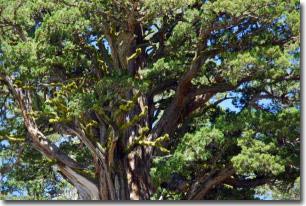Challenging the aging process
Aging and aging are an inevitable part of the lives of most plants and animals. However, some species still live to an extremely rare age, such as a yew tree in England. Currently there is at least one live yew tree and is recorded in the Domesday book.
Very few organisms can present challenges to what we know about evolution, but they seem to have unlimited power to counter the insignificant attack of aging. For example, the Bristlecone pine in the Rockey Mountains can still form foliage when it is over 4000 years old.
New research conducted by ecologist - University of Southampton Dr Patrick Doncaster and mathematician and professor Robert Seymour from the University of London has come up with rules that some species can postpone indefinitely determination of old age.

Bristlecone pine trees in the Rocky Mountains can still form foliage when it was 4,000 years old.(Photo: iStockphoto / Harry Thomas)
Dr Doncaster said: 'Our analysis shows that non-migratory organisms, including some species of plants, have a special ability to delay aging . This ability evolved through many generations of their ancestors, in which younger individuals of the same type living next to 'non-old' trees that want to grow and mature are eliminated '.
The inevitable aging of many reproductive creatures has helped to develop the basis of the theory. In essence, because reproduction causes physical harm, natural selection tends to maintain benefits and limit physical harm until the organism becomes old and weak. The environment's fear easily takes away their life.
'But some organisms grow insignificant, such as hydrology - a simple freshwater animal, or Bristlecone pine. They seem to be able to multiply indefinitely. We have now answered the question of why they can evolve from an old ancestor. Mathematical analysis shows that the elimination of young individuals also facilitates aging decline . Our computer simulations also point out that old-fashioned fleeing measures can also lead to eternal longevity. '
The study of ' Density Dependence Triggers Runaway Selection of Reduced Senescence ' was published in PLoS Computational Biology.
- Mother's gene affects the aging process of children
- Find out how to slow down the aging process
- American scientists happen to reverse the aging process
- Find out the culprit of the aging process
- Determine the control area of aging in the brain
- Aging process - Balancing the process of new self-renewal and aging
- No aging process, will humans become extinct?
- First test of anti-aging drugs in humans
- Regular jogging slows down the aging process
- Video: The aging process of cells causes the body to age
- Interesting finding: The brain uses tips against aging
- Successful preparation of anti-aging drugs: People will immortalize?
 Why do potatoes have eyes?
Why do potatoes have eyes? 'Tragedy' the world's largest carnivorous life: Death becomes ... public toilet
'Tragedy' the world's largest carnivorous life: Death becomes ... public toilet Tomatoes were once considered 'poisonous' for 200 years
Tomatoes were once considered 'poisonous' for 200 years Detecting microscopic parasites on human face
Detecting microscopic parasites on human face